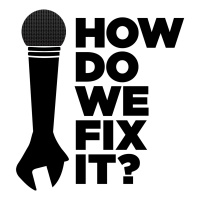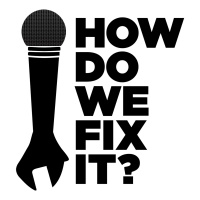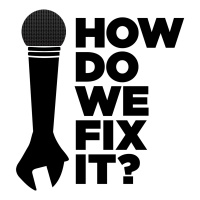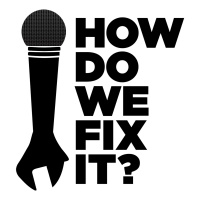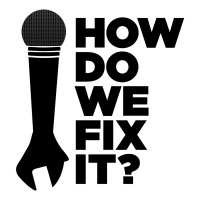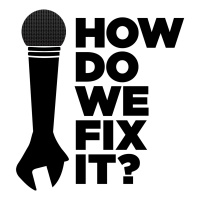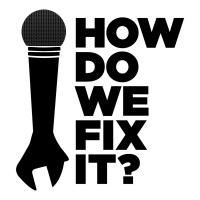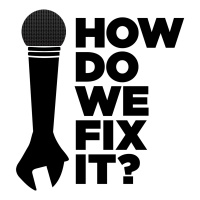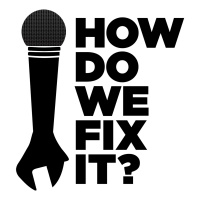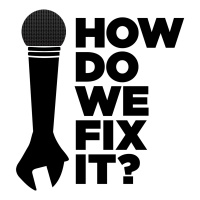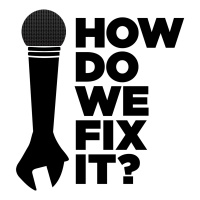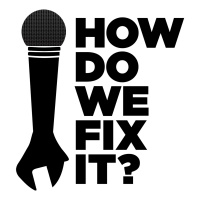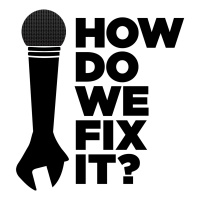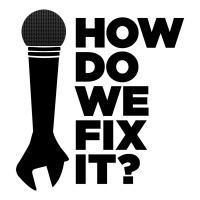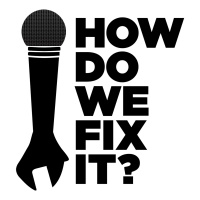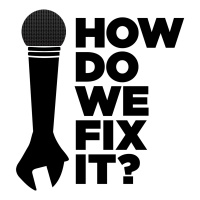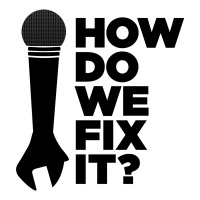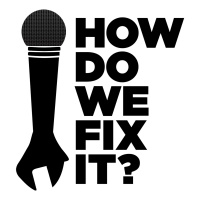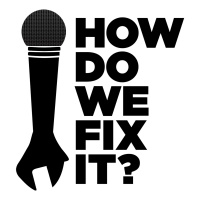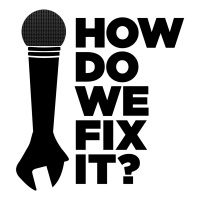How Do We Fix It?
- Autor: Vários
- Narrador: Vários
- Editor: Podcast
- Duración: 183:12:34
- Mas informaciones
Informações:
Sinopsis
From politics to the personal, we're about solutions. Our weekly podcast features two friends and longtime journalists. Join Richard Davies (ABC News) and Jim Meigs (Popular Mechanics) as they challenge authors, experts and provocateurs in a search for positive, practical ideas. Guests include Alan Dershowitz, a noted legal scholar and defender of civil liberties; Mike Rowe of "Dirty Jobs" and Lenore Skenazy, founder of "Free Range Kids." Topics include politics, parenting, personal finance, human behavior and much more. "How Do We Fix It?" - a repair manual for the real world. Produced by DaviesContent
Episodios
-
The Power of Play: Lucy Crehan, Tamara Mose
28/11/2019 Duración: 26minMany of us are spending much of the Thanksgiving holiday with the children we love. In this episode we consider vital role of play, and what it does to expand a child's creativity and resilience.Urban sociologist Tamara Mose is an Associate Professor at Brooklyn College, and author of "The Playdate: Parents, Children and the New Expectations of Play." She tells us about the strengths and perils of playdates, and the need for children to have unstructured play.Educational consultant and teacher, Lucy Crehan, is the author of "Cleverlands", an exploration of the lessons learned from the world's top-performing education systems. Her research also highlights the importance of play in the learning process.In Finland, where math and reading scores are among the highest in the world, "they don't start education formally until seven-years-old," says Lucy. Instead of meeting academic targets in kindergarten or first grade, "they're focusing on a much broader educational and social development before they sta
-
Radical Health. Ivelyse Andino
22/11/2019 Duración: 27minPublished: November 21st, 2019“Tech For The Public Good” is supported by a grant from Solutions Journalism Network.Technology is a double-edged sword. Despite well-publicized threats from bots, hackers, government spooks and huge online firms with their invasive algorithms, tech is often a force for public good.In this special episode, we report on an innovative local effort to promote better healthcare for those who need it most: the residents of America's poorest Congressional District: New York's 15th CD in The Bronx.Ivelyse Andino, founder and CEO of Radical Health, a minority-owned, Bronx-based health equity social enterprise that uses technology, an app powered by artificial intelligence, and community conversations to help black and brown pregnant women and new mothers understand their health care rights, build trust and develop self advocacy. According to US government statistics, black women are up to six times more likely to die from complications of pregnancy than white women. "The U
-
Civility Won't Save America: Reed Galen
15/11/2019 Duración: 25min30 years ago this month the Berlin Wall came down, and Richard was there, reporting the story for ABC News. In those heady days of November, 1989, there was tremendous hope for the future of liberal democracy. In the next few years, most of Eastern Europe would emerge from the shackles of totalitarian communism.But today, populism and nativism are on the rise in much of the world. Democratic institutions, civic norms, and a free press are all facing new challenges.We speak with public affairs and political consultant Reed Galen, and look at whether the case for greater civility is overshadowed by the need to push back hard against the populists, and those who sneer at compromise, tolerance, reason, flexibility and other vital pillars of a functioning democracy."The Democrats are playing chess and Trump's eating the pieces," says Reed, who resigned from the Republican Party in 2016. "He will take your civility and squash you with it."Further thoughts from Reed on civility here.With this epi
-
How We Really Change Our Minds - Eleanor Gordon-Smith
07/11/2019 Duración: 30minWith today's furious political and cultural divisions, it's easy to shake our heads in exasperation at those who disagree with us. In this episode with Australian writer and philosopher, Eleanor Gordon-Smith, we take a journey to the limits of human reason. Her compelling new book, "Stop Being Reasonable. How We Really Change Our Minds," features six high-stakes personal stories of successful persuasion that illustrate what most of us get wrong about rationality. "Hearing the story of how somebody changes their mind is hearing the story of how they change their life," Eleanor tells us. "Why, when we know that changing our minds is as tangled and difficult and messy as we are, do we stay so wedded to the thought that rational debate is the way to go about it?"The book and our podcast begin with Eleanor interviewing men who catcalled her in the street and made obscene gestures. Did she convince these guys to change their behavior? Find out what happened... See acast
-
Understanding Brexit: Jill Rutter
31/10/2019 Duración: 26minConfused by Brexit? This episode looks back over the last 40 months since the shocking result of the Brexit referendum, when UK voters decided to leave the EU. We sort through the mess and misconceptions.The political drama contains several acts: A December election has been called, and a new Brexit deal was reached in late October by Prime Minister Boris Johnson and European Union member states. But well over three years after the referendum, the UK Parliament has yet to agree to the terms of withdrawal. The December 12 vote could bring more confusion, with no party winning an overall majority. One the biggest hurdles is deciding what kind of Brexit voters actually want. For this episode, Richard traveled to London and spoke with Jill Rutter, senior research at the non-partisan think tank, UK in a Changing Europe. She writes frequently about Brexit and the UK's evolving relationship with the EU."The Prime Minister is very keen to be able t
-
Fixing Government and Democracy: David Meyers
25/10/2019 Duración: 25minAmerican democracy is in a moment of crisis. A new Gallup poll, released in late October, says a near-record-high 34% of Americans cite the government, poor leadership or politicians as the most important problem currently facing the U.S.In this episode, we look at the work of a new online news site, The Fulcrum, which is focused exclusively on efforts to reverse the dysfunctions plaguing American democracy. "Our goal is to raise the level of awareness so people can understand what's wrong with the political system, and how they may go about getting involved to help make it better," says David Meyers, publisher and executive editor of The Fulcrum. We look at the controversy over voting rights, access to polling, the role of money in the American political system, gerrymandering, and how a group of volunteer hackers broke into all 100 voting machines they went after. See acast.com/privacy for privacy and opt-out information.
-
Celebrating Nuance: Meghan Daum
18/10/2019 Duración: 27minModern thought has been damaged by dogma and tribalistic click-bait. Social media and the fractured state of politics reward slick slogans and partisan anger while penalizing those who speak with intellectual honesty. Our guest, feminist writer and author, Meghan Daum, says instead of following the crowd we need to think for ourselves. While very supportive of the goals of the women's movement, she is also critical of the excesses of modern feminism. In this episode she makes the case for nuance and feeling conflicted about our own opinions. "I always say to my students, if you're not conflicted you're either lying to yourself or you're not very smart," she says.Meghan is the author of "The Problem With Everything: A Journey Through The New Culture Wars". Her witty and rigorous new book is a personal account of "the conflicted and tortured state of liberalism generally and feminism in particular. But it is also a personal story of feeling existentially unmoored against the backdrop of a co
-
"Listen First & Democracy" Pearce Godwin
10/10/2019 Duración: 21minAmerican democracy is in crisis, with a coarsening of our national conversation and an erosion of public trust that threatens the guardrails of self-government. Many citizens feel dislocated, disempowered and believe that remote institutions and government don't listen to their needs and interests.One way to bridge divides is to listen to a broader range of opinions, from people not like you.Our guest is Pearce Godwin, founder and CEO of Listen First Project, which has 250 partner organizations who have joined the #ListenFirst movement as well as the thousands who have signed the Listen First Pledge.Listen First sounds like a moderate idea, but "I think it really is radical," Pearce tells "How Do We Fix It?" Coming to conversations "with a spirit of curiosity is what will bring us to a place in which we are learning from one another and building greater connections, as opposed to throwing grenades and tearing each other apart."The four key ingredients of a listen first conversati
-
We Need Better Leaders! Davia Temin & Stephen Miles
03/10/2019 Duración: 25minThe furore over the decision by House Democrats to launch a formal impeachment investigation into President Trump will be the subject of heated debate for many months. In this episode we take a deeper look at leadership, and why good leaders are so vital to the future of our democracy, and for all organizations-- large and small. "In times of turmoil this is even more important," says our guest, Davia Temin, a highly experienced crisis manager, and leadership and communications coach. "Leadership is particularly important right now, because we are living in a very muddy universe."In business and non-profit organizations, highly successful leaders have learned vital lessons about strategy, communication and ethics. We hear from Stephen Miles, a widely respected leadership coach and top-level succession planning executive. His deep understanding of what makes great leaders is featured in The Miles Group podcast series, "C-Suite Intelligence: Leadership Lessons F
-
Dementia: Memory and Forgetting: Nicci Gerrard
27/09/2019 Duración: 32minDementia provokes profound moral questions about our society and the meaning of life itself. How much are we connected to one another? In what ways are we distant and separated? What does it mean to have a self? How can we offer dignity to those who suffer from Alzheimer's and other forms of this terrible disease?Worldwide around 50 million people have dementia. The US Centers for Disease Control estimates that the U.S. total is more than five million. The numbers are growing with the aging of the population. The incidence of Alzheimers increased more than 50% in the pst 15 years. People over the age of 85 are the largest growing share of the population.British journalist and author Nicci Gerrard is our guest. Her father's long struggle with dementia led Nicci to investigate what the disease does to those who live with it and to their caregivers. She writes with deep wisdom, kindness and empathy in her new book, "The Last Ocean A Journey Through Memory and Forgetti
-
Immigration Facts -- Not Emotion. Andrew Selee
20/09/2019 Duración: 27minWith harsh rhetoric from President Trump, who wants strict new limits on refugees, asylum seekers and some other forms of immigration, to calls by several Democratic Presidential candidates to decriminalize all border crossings, the immigration debate is increasingly dominated by slogans rather than substance.Hopes for a comprehensive and humane overhaul of U.S. immigration law have all but disappeared for now."The reality is illegal immigration has come to be THE conversation, says our guest, Andrew Selee, President of the non-partisan Migration Policy Institute, which seeks to improve immigration policies through fact-based research. "Most immigration in the United States is legal immigration," he says. "What we're not talking about is that most people are legal immigrants, and that most people are coming Asia, rather than Latin America."Also, he says: "immigrants on average have a higher education level than native-born Americans, which is something few of us realize."In this episode, we unp
-
Kids Aren't Fragile! Lenore Skenazy
12/09/2019 Duración: 25minKids are smart, strong, and at least as capable as their parents were at their age. So, when the crime rate is at a 50-year-low, why does society insist on bubble-wrapping them? Why are we encouraged to protect children from minor cases of physical or mental discomfort? Why don’t we trust them to do things safely or successfully on their own?These questions about raising kids are tackled in this episode of "How Do We Fix It?" We consider practical solutions for parents and schools."Treating kids as physically and emotionally fragile is bad for their future, and ours," says our guest, Lenore Skenazy, founder of Free Range Kids and President of Let Grow, a group that helps schools set-up unstructured free play before and after school hours.A recent study published in the Journal of Abnormal Psychology found that rates of depression among teenagers rose nearly 60% since 2009. The number of young people seen in emergency rooms who had attempted suicide or rep
-
Risk: An Economist Walks Into a Brothel. Allison Schrager
05/09/2019 Duración: 27minFrom dating to switching jobs and managing retirement. We all manage risk. Want to get better at it?The best way to learn is to ask some of the real experts: Magicians, gamblers, big-wave surfers, horse breeders, and prostitutes. That's what economist, journalist and risk advisor Allison Schrager did. She's our guest in this episode.For people faced with risky decisions every day, making the right choices can be the difference between success or failure, and in some cases, life and death. Allison is the author of the new book "An Economist Walks Into a Brothel: And Other Unexpected Places to Learn About Risk." She visited Nevada's Moonlight Bunny Ranch brothel, hung out with paparazzi who stalked celebrities, spoke with movie makers in Hollywood, and went to a risk conference for surfers in Hawaii as part of her extensive research for the book.We learn basic lessons about human psychology as well as hedging, diversification, leverage and insurance. "You take risks to get wha
-
The Threat From China: Elizabeth Economy
29/08/2019 Duración: 27minA trade war with China is a growing threat to U.S. influence and the global economy. What began more than a year ago with President Trump’s decision to impose tariffs has become an unpleasant economic reality for many American businesses. Recently, the U.S. labeled China a “currency manipulator.” But Perhaps, an even larger long-term threat comes China’s aggressive espionage offensive that is playing out in behind-the-scenes as of the U.S. and China struggle for global dominance.Our guest is Elizabeth Economy, a senior fellow and director of Asia studies at the Council on Foreign Relations in New York. Her most recent book, “The Third Revolution: Xi Jinpeng and the New Chinese State”, explains the background to recent dramatic changes inside China.She is among a distinguished group of China specialists who once favored engagement with Beijing, but are now calling for the United States to take a more forceful approach as China attempts to undermine democratic values.&nbs
-
Rising Risks of Recession: Diana Henriques
22/08/2019 Duración: 25minIs the U.S. economy about to fall off a cliff? Declining growth, financial market jitters, and a growing rift between the U.S. and China are all fueling fears of a recession.For the first time in 12 years, since shortly before the last recession, interest rate yields on 10-year government notes are lower than for short-term loans. This inverted yield curve is highly unusual and the latest sign that a sharp slowdown could happen soon."The inverted yield curve has accurately predicted seven out of the last seven recessions in the past half century, says our guest, award-winning financial journalist and best-selling author Diana Henriques. In this episode we look at the risks of a recession and constructive ways to handle it. These include:- "A calming voice from the cockpit." The need for wise leadership and strong communication skills from The White House.- Experienced financial regulators who know what to do in a crisis.- Greater attention from big business to the needs of s
-
The Case for Trust - Jerry Michalski
15/08/2019 Duración: 26minWe live in a time of suspicion and mistrust. What is this costing all of us in lost productivity, creativity and shared humanity? Isn't there a better way to design our organizations and systems? A recent Pew Research poll found that a majority of Americans believe that most people just look out for themselves, and that they would take advantage of you if they got the chance."We’ve internalized the assumption that humans can’t be trusted, and therefore, that we all need to be constrained and coerced into doing the right thing, pretty much all the time," wrote our guest, technology consultant, futurist and thinker Jerry Michalski, in a recent blog post.And yet, there are examples of systems designed from trust that work surprisingly well. - Anyone can edit and make changes to Wikipedia pages. Most of us rely on this open-source online encyclopedia for accurate information. - Micro loans go to people of very limited means, who should be terrible credit risk
-
Mass Shootings: After El Paso & Dayton
09/08/2019 Duración: 28minMost of America's deadliest mass killings have happened within the last ten years. The deaths of more than 30 people in El Paso, Texas, and Dayton, Ohio, have led to renewed demands for federal background checks and gun violence restraining orders, or "red flag" laws.America is also facing a growing crisis of violent extremism and white nationalist terrorism. The FBI and other law enforcement agencies are under pressure to expand their investigations.In testimony before Congress, FBI Director Christopher Wray, said white supremacy poses a “persistent” and “pervasive” threat to the United States.In this episode, we look at a range of solutions, with the understanding that no single proposal is likely to lead to a dramatic reduction in domestic terrorism, mass shootings, gun homicides, or racial hatred.We hear from James Burnett, Editorial Director of The Trace, an independent news site that covers America's gun violence crisis. He explains that the U.S. has the highest homicide rate among all industrializ
-
Rebuilding The Social Contract: Debilyn Molineaux
01/08/2019 Duración: 25minOur democracy has become a punching bag. From Russian hacking and hate-filled tweets, to demands for impeachment and increasingly nasty political infighting, our public conversation is increasingly narrow, dispiriting and disempowering.According to Pew Research, trust in government is near historic lows. Most Americans believe that declining trust in our public institutions and in each other make it harder to solve key problems. A new poll says 75% of Americans say trust in government is shrinking, while 64% say this is also true for each other-- suggesting we have become more fearful and suspicious.Our guest, Debilyn Molineaux, Executive Director and co-founder of Bridge Alliance, says it's time to restore the nation's social contract. Her organization works to transform the political process by finding new and effective ways to bridge divides in our politics and among our families and local communities. Find out more in this episode.Bridge Alliance has more than 80 member
-
Disaster for Democrats? Daniel Akst
26/07/2019 Duración: 24minPresident Trump's tweets that four minority Democratic congresswomen should “go back” to the countries they came from, and chants of "send her back" at his rally in North Carolina provoked outrage and disgust from his critics. American politics appear trapped in a spiral of toxic fury, and this angry mix may precisely match the pugilistic President's preference as he wades into the 2020 campaign.Our guest, opinion writer and author, Daniel Akst argues that Trump's clear, simple story on the economy, trade with China, and immigration that may appeal to many voters.Despite the President's negative poll ratings, and a chaotic White House, Democrats are having a miserable summer, with a stumbling frontrunner and the rise of the hard left. "They have found themselves in reaction to this horrible man moving ever further from any constraints on immigration of any kind, says Daniel. "I don't think that will play with the voters." We discuss the crisis, look for solutions,
-
Technology for Public Good: Micah Sifry
12/07/2019 Duración: 28minSocial media is under fire for how it threatens our society, our politics, even our mental health.Facebook, Google, Twitter and other tech giants are criticized for spying on us and using secret algorithms to push us toward extreme views.Civic Hall is a key player in a growing movement to use technology to better the world-- what people are calling "civic tech".Our guest, Micah Sifry, co-founder and President of Civic Hall, is a longtime advocate for transparency, better government, and using tech for social change. "The problems that we face as a society are not going to be solved by tech alone," he says. Most of the problem-solving work that we see and support at Civic Hall is, at most, 20% tech and 80% social." In this episode we highlight the work of several groups, including Code For America, which is on a mission to make government work in the digital age, and Ushahidi, an organization that builds tools to solve the world's biggest humanitarian and international development chal

